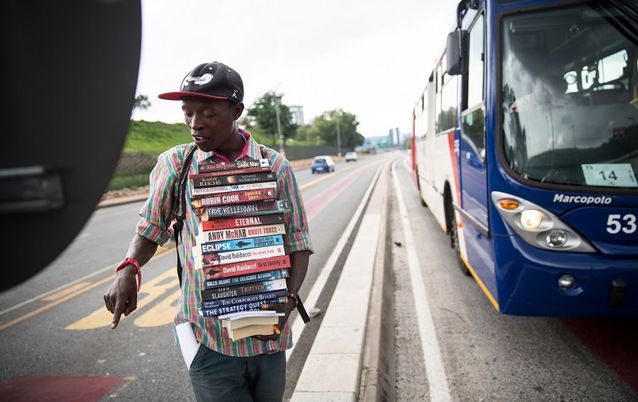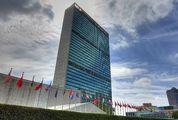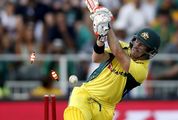PHILANI Dladla, arguably the world’s most famous "homeless" bookworm, is not to be trifled with when it comes to his knowledge of books. It ranges from Wuthering Heights and A Tale of Two Cities, to biographies on Richard Branson and Warren Buffett. Mention a fictional character, or a business or political personality, and he’s off, trotting out facts and figures.
He regularly reads Forbes Magazine, has started a foundation for underprivileged kids, plans to set up a nonprofit organisation that will see some of them funded for university, and gives motivational talks to corporates. A couple of years back, "I was the only homeless man I knew with a Twitter account and a Facebook page," he says.
Just more than a year ago, he was invited by TEDx Talks, a nonprofit organisation devoted to "ideas worth spreading", to talk about his life.
His is no sleek success story. After spending hours with him at his pavement "mobile bookstore" on the street alongside Greenside’s Doppio Zero, the impression is one of both brilliance and fragility.
Books have given him life, yet nearly ended it. If he had stayed at his family home near Port Shepstone, it’s possible he’d not have ended up on the streets of Johannesburg. Chances are he’d not have been repeatedly badly beaten and threatened with death by jealous street kids. Maybe he would not have had the money to buy the drugs with which he attempted suicide.
Yet, his alter ego, the book lover, has brought him a wealth of friends as passionate about the written word as he is. Sensing his extraordinary potential, they have lifted him from the gutter and helped to give him back his life.
Most of these friends Dladla describes as "sweet". It’s one of his favourite words and he uses it liberally to describe those who have paid his rent, bought him clothes, given him food, and bought his books.
Initially, however, he was loath to part with the books he brought with him to Johannesburg from the coast. He was 12 when his domestic worker mother’s employer gave him Frederik van Zyl Slabbert’s heavyweight, The Last White Parliament, to read. When his mother’s boss died, he not only left her his car, furniture and money, but his considerable library to Dladla, "and got me addicted to books".
Post-matric, he also became addicted to drugs, so his mother sent him to Johannesburg to live with a friend. He worked at Gramadoelas restaurant as a waiter. Drugs eventually cost him his job, his apartment, and even the clothes he was forced to part with to other street kids in exchange for being allowed to sleep under Nelson Mandela Bridge.
He decided not to beg, hassle, or steal from motorists. Instead, he turned to what he knew and loved best — books. Operating near the University of the Witwatersrand entrance on Empire Road, he gave motorists short, sharp reviews of books he held up to car windows in return for a donation.
He was initially reluctant to sell the books, but realised doing so would create an income. Soon his growing number of motorist friends started giving him books.
One, a businessman, tricked the then 22-year-old into going to his office, where he raped Dladla. It shows the mettle of the youngster — he is now 27 — that he reported the crime to the police. Nothing came of the charge he laid.
Deeply depressed, and without trauma counselling, he tried to end his life. A stranger saved him, he was hospitalised, and then sent to Sterkfontein Psychiatric Hospital. He was diagnosed with bipolar disorder.
There, within months, a social worker helped to get him back on his feet and found a friend of his who offered to pay for accommodation, clothes, and food.
Dladla returned to his Empire Road pavement bookstore and might well have remained there, if not for a two-minute video clip on him that went viral on YouTube.
Soon local and international media were beating a path to his nonexistent door. "Everyone wanted to know who I was and if the Pavement Bookworm really existed," Dladla says.
Books and money began pouring in. A friend stored the former and banked the latter for him.
But his success drove a "street king who ruled us guys", wild with envy. A TV camera team filming Dladla hastily beat a retreat when he was beaten up. After this, the pavement bookworm relocated to Gleneagles Road in Greenside, where he’s a familiar sight.
Before his relocation, he had started a soup kitchen for street kids, "in order to spend my money on something good that was not drugs".
He also started a book club in Joubert Park in downtown Johannesburg to keep youngsters busy after school. Word of mouth has seen it grow from two to 250 school children. He’s hoping to move it into a building being redeveloped near the park, "because parents complain about the druggies hanging around".
Dladla, so often homeless, is about to move into a bachelor pad rented for him, "by a kind woman".
The Pavement Bookworm, an account of his life and by extension that of the homeless living under city bridges, is written as he speaks — clearly and vividly. It nearly did not happen. Rats chewed his notes, rain splattered them, and the laptop a friend gave him was taken from him when he was robbed at midday on a Johannesburg street. He nearly gave up. Years of painstaking notes about his daily life had vanished. "They broke my heart, but not my spirit."
No matter what further extraordinary events — and the book is crammed with them — befall this young man, his evocative, powerfully wise and philosophical words will survive.
Title: The Pavement Bookworm
Author: Philani Dladla
Publisher: Blackbird Books

Philani Dladla stands on the side of Empire Road in Braamfontein, next to the University of the Witwatersrand, where he previously sold books to motorists. Picture: DANIEL BORN
PHILANI Dladla, arguably the world’s most famous "homeless" bookworm, is not to be trifled with when it comes to his knowledge of books. It ranges from Wuthering Heights and A Tale of Two Cities, to biographies on Richard Branson and Warren Buffett. Mention a fictional character, or a business or political personality, and he’s off, trotting out facts and figures.
He regularly reads Forbes Magazine, has started a foundation for underprivileged kids, plans to set up a nonprofit organisation that will see some of them funded for university, and gives motivational talks to corporates. A couple of years back, "I was the only homeless man I knew with a Twitter account and a Facebook page," he says.
Just more than a year ago, he was invited by TEDx Talks, a nonprofit organisation devoted to "ideas worth spreading", to talk about his life.
His is no sleek success story. After spending hours with him at his pavement "mobile bookstore" on the street alongside Greenside’s Doppio Zero, the impression is one of both brilliance and fragility.
Books have given him life, yet nearly ended it. If he had stayed at his family home near Port Shepstone, it’s possible he’d not have ended up on the streets of Johannesburg. Chances are he’d not have been repeatedly badly beaten and threatened with death by jealous street kids. Maybe he would not have had the money to buy the drugs with which he attempted suicide.
Yet, his alter ego, the book lover, has brought him a wealth of friends as passionate about the written word as he is. Sensing his extraordinary potential, they have lifted him from the gutter and helped to give him back his life.
Most of these friends Dladla describes as "sweet". It’s one of his favourite words and he uses it liberally to describe those who have paid his rent, bought him clothes, given him food, and bought his books.
Initially, however, he was loath to part with the books he brought with him to Johannesburg from the coast. He was 12 when his domestic worker mother’s employer gave him Frederik van Zyl Slabbert’s heavyweight, The Last White Parliament, to read. When his mother’s boss died, he not only left her his car, furniture and money, but his considerable library to Dladla, "and got me addicted to books".
Post-matric, he also became addicted to drugs, so his mother sent him to Johannesburg to live with a friend. He worked at Gramadoelas restaurant as a waiter. Drugs eventually cost him his job, his apartment, and even the clothes he was forced to part with to other street kids in exchange for being allowed to sleep under Nelson Mandela Bridge.
He decided not to beg, hassle, or steal from motorists. Instead, he turned to what he knew and loved best — books. Operating near the University of the Witwatersrand entrance on Empire Road, he gave motorists short, sharp reviews of books he held up to car windows in return for a donation.
He was initially reluctant to sell the books, but realised doing so would create an income. Soon his growing number of motorist friends started giving him books.
One, a businessman, tricked the then 22-year-old into going to his office, where he raped Dladla. It shows the mettle of the youngster — he is now 27 — that he reported the crime to the police. Nothing came of the charge he laid.
Deeply depressed, and without trauma counselling, he tried to end his life. A stranger saved him, he was hospitalised, and then sent to Sterkfontein Psychiatric Hospital. He was diagnosed with bipolar disorder.
There, within months, a social worker helped to get him back on his feet and found a friend of his who offered to pay for accommodation, clothes, and food.
Dladla returned to his Empire Road pavement bookstore and might well have remained there, if not for a two-minute video clip on him that went viral on YouTube.
Soon local and international media were beating a path to his nonexistent door. "Everyone wanted to know who I was and if the Pavement Bookworm really existed," Dladla says.
Books and money began pouring in. A friend stored the former and banked the latter for him.
But his success drove a "street king who ruled us guys", wild with envy. A TV camera team filming Dladla hastily beat a retreat when he was beaten up. After this, the pavement bookworm relocated to Gleneagles Road in Greenside, where he’s a familiar sight.
Before his relocation, he had started a soup kitchen for street kids, "in order to spend my money on something good that was not drugs".
He also started a book club in Joubert Park in downtown Johannesburg to keep youngsters busy after school. Word of mouth has seen it grow from two to 250 school children. He’s hoping to move it into a building being redeveloped near the park, "because parents complain about the druggies hanging around".
Dladla, so often homeless, is about to move into a bachelor pad rented for him, "by a kind woman".
The Pavement Bookworm, an account of his life and by extension that of the homeless living under city bridges, is written as he speaks — clearly and vividly. It nearly did not happen. Rats chewed his notes, rain splattered them, and the laptop a friend gave him was taken from him when he was robbed at midday on a Johannesburg street. He nearly gave up. Years of painstaking notes about his daily life had vanished. "They broke my heart, but not my spirit."
No matter what further extraordinary events — and the book is crammed with them — befall this young man, his evocative, powerfully wise and philosophical words will survive.
Title: The Pavement Bookworm
Author: Philani Dladla
Publisher: Blackbird Books


















Change: 0.91%
Change: 0.81%
Change: 2.99%
Change: -0.19%
Change: 2.23%
Data supplied by Profile Data
Change: -0.43%
Change: 0.15%
Change: 0.91%
Change: 0.00%
Change: -0.07%
Data supplied by Profile Data
Change: 0.01%
Change: -0.48%
Change: -0.29%
Change: 0.00%
Change: 0.46%
Data supplied by Profile Data
Change: 0.53%
Change: 2.25%
Change: 0.58%
Change: 3.79%
Change: 2.53%
Data supplied by Profile Data